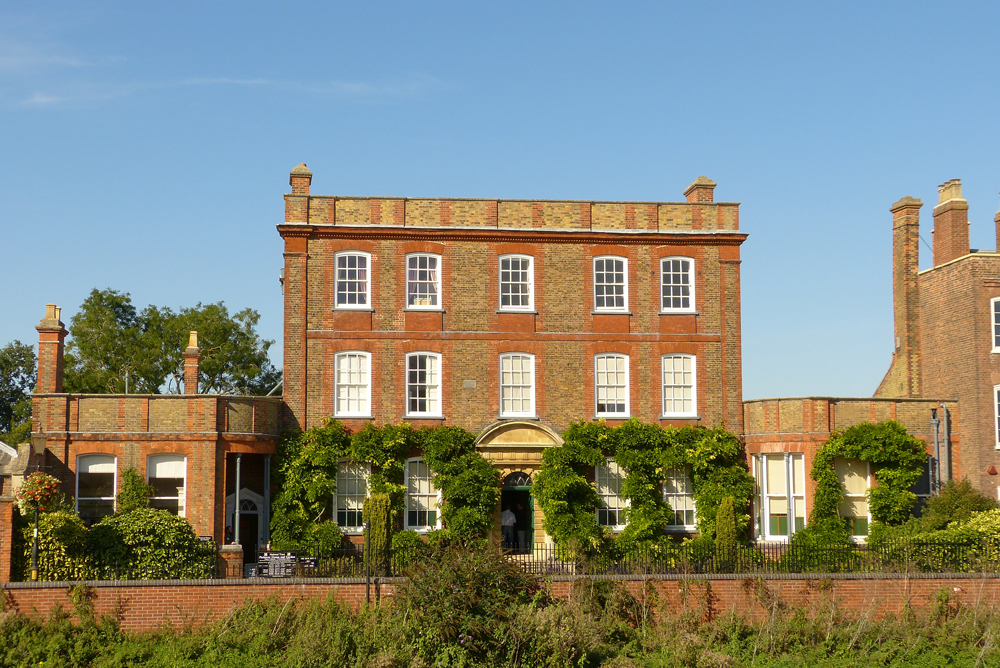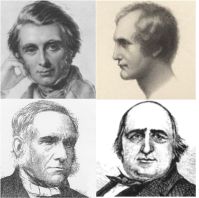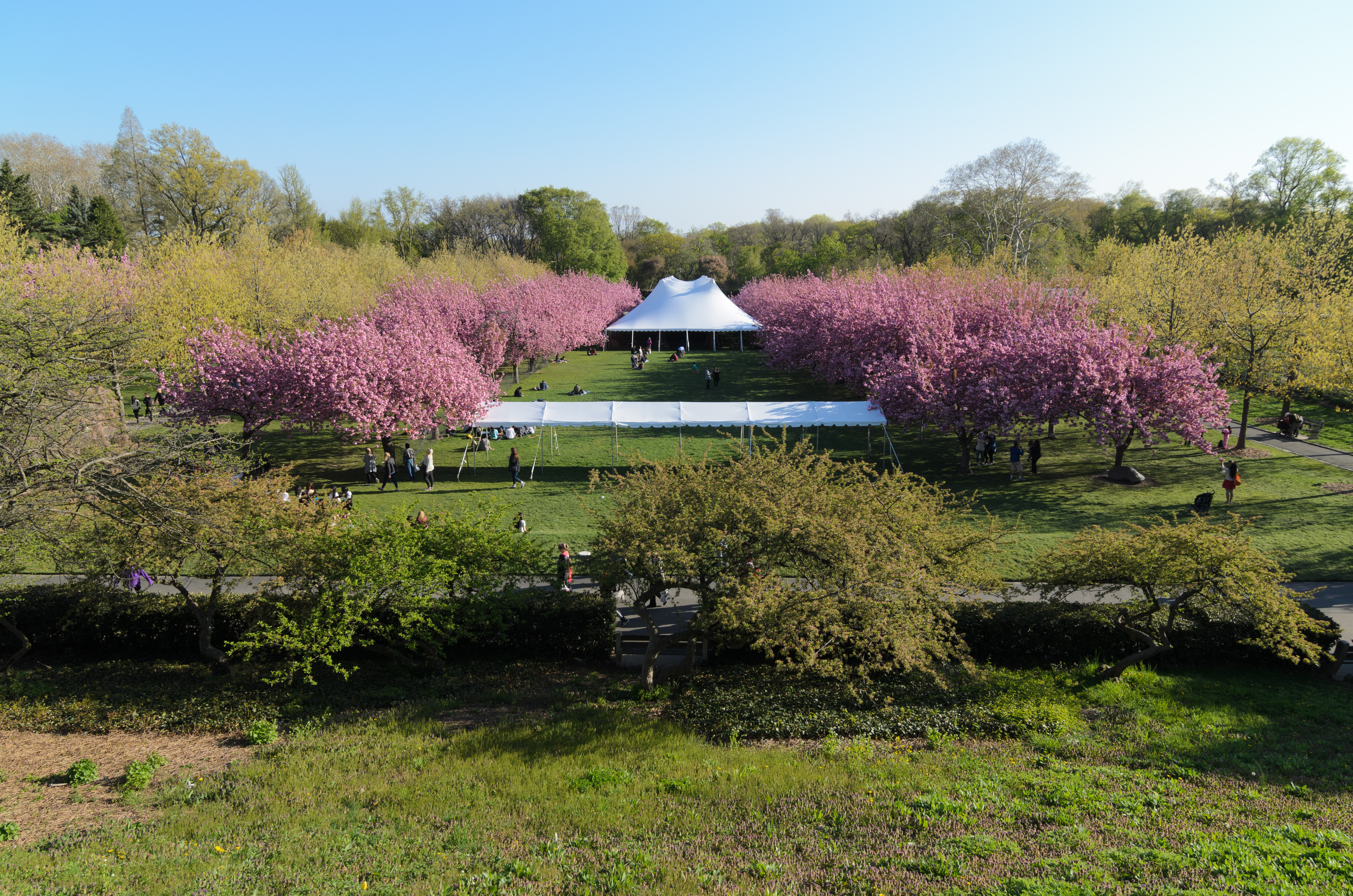|
Peckover House
Peckover House & Garden is a National Trust property located in North Brink, Wisbech, Isle of Ely, Cambridgeshire, England. History The house was built in 1722 and later bought by Alfred Southwell. It was bought by Jonathan Peckover at the end of the 18th century. Alexander Peckover was created Baron Peckover in 1907. During the period in which the building was in the ownership of the Peckovers, the building was known as Bank House. During the Second World War local tradition has it that Alexandrina Peckover, the largest contributor to the Wisbech Spitfire Fund, did so in lieu of giving up the railings in front of the house for the war effort. The Peckovers, a Quaker banking family and owners of the Peckover Bank, presented the building to the National Trust in 1948. The house was given a grade II listed building status in 1985. The garden was filmed by the BBC in 1997. Architecture and grounds The exterior of the house gives little idea of the elaborate and elegant interior of ... [...More Info...] [...Related Items...] OR: [Wikipedia] [Google] [Baidu] |
Octavia Hill
Octavia Hill (3 December 1838 – 13 August 1912) was an English Reform movement, social reformer, whose main concern was the welfare of the inhabitants of cities, especially London, in the second half of the nineteenth century. Born into a family of radical thinkers and reformers with a strong commitment to alleviating poverty, she herself grew up in straitened circumstances owing to the financial failure of her father's businesses. With no formal schooling, she worked from the age of 14 for the welfare of working people. Hill was a moving force behind the development of social housing, and her early friendship with John Ruskin enabled her to put her theories into practice with the aid of his initial investment. She believed in self-reliance, and made it a key part of her housing system that she and her assistants knew their tenants personally and encouraged them to better themselves. She was opposed to municipal provision of housing, believing it to be bureaucratic and impers ... [...More Info...] [...Related Items...] OR: [Wikipedia] [Google] [Baidu] |
Grade I Listed Houses
Grade most commonly refers to: * Grade (education), a measurement of a student's performance * Grade, the number of the year a student has reached in a given educational stage * Grade (slope), the steepness of a slope Grade or grading may also refer to: Music * Grade (music), a formally assessed level of profiency in a musical instrument * Grade (band), punk rock band * Grades (producer), British electronic dance music producer and DJ Science and technology Biology and medicine * Grading (tumors), a measure of the aggressiveness of a tumor in medicine * The Grading of Recommendations Assessment, Development and Evaluation (GRADE) approach * Evolutionary grade, a paraphyletic group of organisms Geology * Graded bedding, a description of the variation in grain size through a bed in a sedimentary rock * Metamorphic grade, an indicatation of the degree of metamorphism of rocks * Ore grade, a measure that describes the concentration of a valuable natural material in the surroundi ... [...More Info...] [...Related Items...] OR: [Wikipedia] [Google] [Baidu] |
Grade I Listed Buildings In Cambridgeshire
There are approximately 372,905 listed buildings in England and 2.5% of these are Grade I. This page is a list of these buildings in the county of Cambridgeshire,http://www.heritagegateway.org.uk/Gateway/Advanced_Search.aspx?reset=true English Heritage Gateway by district. Cambridge City of Peterborough East Cambridgeshire Fenland Huntingdonshire South Cambridgeshire See also * Grade II* listed buildings in Cambridgeshire Notes References External links {{DEFAULTSORT:Grade I Listed Buildings in Cambridgeshire Grade I listed In the United Kingdom, a listed building or listed structure is one that has been placed on one of the four statutory lists maintained by Historic England in England, Historic Envi ... [...More Info...] [...Related Items...] OR: [Wikipedia] [Google] [Baidu] |
Historic House Museums In Cambridgeshire
History (derived ) is the systematic study and the documentation of the human activity. The time period of event before the invention of writing systems is considered prehistory. "History" is an umbrella term comprising past events as well as the memory, discovery, collection, organization, presentation, and interpretation of these events. Historians seek knowledge of the past using historical sources such as written documents, oral accounts, art and material artifacts, and ecological markers. History is not complete and still has debatable mysteries. History is also an academic discipline which uses narrative to describe, examine, question, and analyze past events, and investigate their patterns of cause and effect. Historians often debate which narrative best explains an event, as well as the significance of different causes and effects. Historians also debate the nature of history as an end in itself, as well as its usefulness to give perspective on the problems of the p ... [...More Info...] [...Related Items...] OR: [Wikipedia] [Google] [Baidu] |
National Trust Properties In Cambridgeshire
National may refer to: Common uses * Nation or country ** Nationality – a ''national'' is a person who is subject to a nation, regardless of whether the person has full rights as a citizen Places in the United States * National, Maryland, census-designated place * National, Nevada, ghost town * National, Utah, ghost town * National, West Virginia, unincorporated community Commerce * National (brand), a brand name of electronic goods from Panasonic * National Benzole (or simply known as National), former petrol station chain in the UK, merged with BP * National Car Rental, an American rental car company * National Energy Systems, a former name of Eco Marine Power * National Entertainment Commission, a former name of the Media Rating Council * National Motor Vehicle Company, Indianapolis, Indiana, USA 1900-1924 * National Supermarkets, a defunct American grocery store chain * National String Instrument Corporation, a guitar company formed to manufacture the first resonator g ... [...More Info...] [...Related Items...] OR: [Wikipedia] [Google] [Baidu] |
Gardens In Cambridgeshire
A garden is a planned space, usually outdoors, set aside for the cultivation, display, and enjoyment of plants and other forms of nature. The single feature identifying even the wildest wild garden is ''control''. The garden can incorporate both natural and artificial materials. Gardens often have design features including statuary, follies, pergolas, trellises, stumperies, dry creek beds, and water features such as fountains, ponds (with or without fish), waterfalls or creeks. Some gardens are for ornamental purposes only, while others also produce food crops, sometimes in separate areas, or sometimes intermixed with the ornamental plants. Food-producing gardens are distinguished from farms by their smaller scale, more labor-intensive methods, and their purpose (enjoyment of a hobby or self-sustenance rather than producing for sale, as in a market garden). Flower gardens combine plants of different heights, colors, textures, and fragrances to create interest and delight the se ... [...More Info...] [...Related Items...] OR: [Wikipedia] [Google] [Baidu] |
Country Houses In Cambridgeshire
A country is a distinct part of the world, such as a state, nation, or other political entity. It may be a sovereign state or make up one part of a larger state. For example, the country of Japan is an independent, sovereign state, while the country of Wales is a component of a multi-part sovereign state, the United Kingdom. A country may be a historically sovereign area (such as Korea), a currently sovereign territory with a unified government (such as Senegal), or a non-sovereign geographic region associated with certain distinct political, ethnic, or cultural characteristics (such as the Basque Country). The definition and usage of the word "country" is flexible and has changed over time. ''The Economist'' wrote in 2010 that "any attempt to find a clear definition of a country soon runs into a thicket of exceptions and anomalies." Most sovereign states, but not all countries, are members of the United Nations. The largest country by area is Russia, while the smallest is ... [...More Info...] [...Related Items...] OR: [Wikipedia] [Google] [Baidu] |
Dean Spanley
''Dean Spanley'' is a 2008 British comedy drama film, with fantastic elements, directed by Fijian New Zealander Toa Fraser. Set in Edwardian England, the film is based on an Alan Sharp adaptation of Irish author Lord Dunsany's 1936 novella ''My Talks with Dean Spanley''. It stars Sam Neill as the Dean, Jeremy Northam and Peter O'Toole as Fisk Junior and Fisk Senior respectively and Bryan Brown as Wrather. Plot The narrative is called "a surreal period comedic tale of canine reincarnation exploring the relationships between father and son and master and dog". Peter O'Toole said that the film's use of comedy to explore the relationship between a father and son was part of the attraction for him: "All of us have had these difficult familial relationships and I think it's a film for all of us who understand the relationship between a father and son. It's been interesting watching how various members of the crew have been looking at the monitors during scenes, because they come up to me ... [...More Info...] [...Related Items...] OR: [Wikipedia] [Google] [Baidu] |
Peter Seabrook
Peter John Seabrook Order of the British Empire (MBE), MBE (2 November 1935 – 14 January 2022) was a British gardening writer and television broadcaster, presenting programmes including the BBC's ''Gardeners' World''. He wrote a gardening column in ''The Sun (United Kingdom), The Sun'' newspaper for over 40 years. He was appointed an MBE in 2005. Early life Seabrook was born in Chelmsford, Essex, on 2 November 1935, as the son of a farmer. He grew up in Galleywood, near Chelmsford. With the help of international contacts, he started work in the horticultural industry aged 10, taking up full-time employment by 16. He paid for a Nursery (horticulture), nursery tour of the Netherlands with money raised selling sweet peas from his back garden to a local florist.Peter Seabrook biography , Sun Gardening. He attended King Edward VI Gramma ... [...More Info...] [...Related Items...] OR: [Wikipedia] [Google] [Baidu] |
John Gordon (author)
John (Jack) William Gordon (19 November 1925 – 20 November 2017) was an English writer of young-adult supernatural fiction. He wrote sixteen fantasy novels including '' The Giant Under the Snow'', four short story collections, over fifty short stories, and a teenage memoir. Most of Gordon's novels are in the supernatural fantasy and horror genres and feature teenagers in the central roles. The adventures are often set in the Fens, an environment Gordon found mysterious and inspirational in his own adolescence, and contain elements of East Anglian folklore such as the ''doom dog'' – Black Shuck. His work has been compared to that of the ghost novelist M.R. James. Indeed, ''The House on the Brink'' (1970) is regarded by admirers as one of the greatest novels in the Jamesian Tradition. His short stories have appeared in more than 50 anthologies and other publications and he is included in ''The Cambridge Guide to Children's Books in English''. His work has been translated int ... [...More Info...] [...Related Items...] OR: [Wikipedia] [Google] [Baidu] |
Angles Theatre
The Angles Theatre is a theatre and historic Georgian playhouse in the market town of Wisbech, Isle of Ely, Cambridgeshire, England. It is among the oldest of Britain's theatres. The current premises consists of the original theatre building and a former library, originally an 'infant' school built in 1837, both of which are Grade II listed. The patrons are Sir Derek Jacobi, Jo Brand, Claire Tomalin and Dame Cleo Laine. The theatre was believed to have been built in 1790 as part of the Lincoln theatre circuit and was generally referred to as the Wisbech Theatre. Regular performances at the theatre continued until about 1850 when it was used as a concert room for a number of years. At the end of the 19th century, part of the property was used by the School of Science and Art. The building was returned to use as a theatre and arts venue, and renamed as The Angles, in 1978. History 18th century The Licensing Act 1737 created the office of Examiner of Plays, whose responsibi ... [...More Info...] [...Related Items...] OR: [Wikipedia] [Google] [Baidu] |


.jpg)

